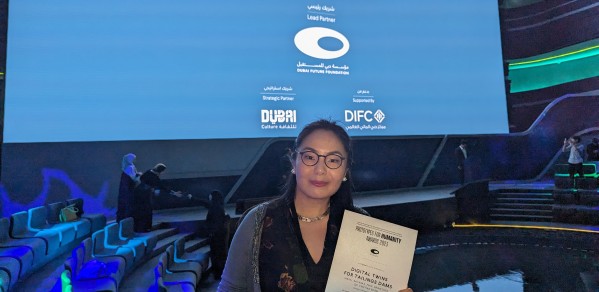
The project 'Digital Twins For Tailings Dams' has won the Data Sciences & AI-Enabled Solutions prize at the COP28 Prototypes for Humanity initiative, which finds innovative solutions for social and environmental issues.
This award spotlights the transformative role of satellite monitoring, machine learning, geotechnical modelling and digital twin technology will have in how we manage tailings dams worldwide.
Dr Brian Sheil Laing O'Rourke Associate Professor in Construction Engineering.
Digital Twins For Tailings Dams, is a satellite-based early warning system to monitor the stability of tailings storage facilities (TSFs), preventing potential catastrophic failures. The World Bank highlights a need for 3 billion tons of metals for the energy transition, intensifying challenges for the mining sector. Remarkably, over 98% of materials like copper end up as waste, stored in TSFs. With over 30,000 TSFs globally, a quarter are abandoned and unmonitored. By integrating geotechnical engineering, satellite remote sensing, and machine learning, Digital Twins 4 Tailings Dams aspire to establish a Digital Twin system to monitor these critical infrastructures.
The research group is: PhD student Maral Bayaraa and Dr Cristian Rossi from the University of Oxford and Dr Brian Sheil from the Laing O'Rourke Centre for Construction Engineering and Technology, University of Cambridge.
Dr Brian Sheil says "We are delighted to have our research on tailings dams recognised in this way. This award spotlights the transformative role of satellite monitoring, machine learning, geotechnical modelling and digital twin technology will have in how we manage tailings dams worldwide. This research has been intrinsic to the wider Digital Twins research that we are carrying out in the Laing O’Rourke Centre for Construction Engineering Technology at University of Cambridge, where we are working towards achieving step-change improvements in sustainability, productivity and safety for the construction industry."
Learn more about Maral's PhD research, supervised by Dr Brian Sheil, on how satellites and AI can help transition to greener energy.
For Maral mining is close to her heart.
"I'm from Mongolia, which is one of the most resource-rich countries in the world, and I've seen the huge amount of good mining can do," she said.
"But I've also seen the really dark side of mining and that's why I've always wanted to be a part of this conversation - making mining more sustainable."
“I believe the award is a part of the recognition of the huge role that Earth Observation, our industry, plays in tackling some of today's biggest challenges. Earth Observing satellites can be likened to 'macro-scopes' drifting around the Earth. Just as micro-scopes provide insights on the tiny 'micro' scale and contribute to solving diseases, Earth Observation macro-scopes contribute to our understanding on a larger scale. Satellites were among the initial tools that helped quantify and draw attention to climate change. An interesting recognition of this is the recent naming of Antarctic glaciers after satellites! Our research focuses on global monitoring of critical infrastructure, such as tailings dams that contain toxic mine waste.”
The winners were selected from more than 3,000 entries submitted from 710 universities in 108 countries.
About the award:
The COP28 Prototypes for Humanity initiative awards celebrate the next generation of innovators and their commitment to finding solutions for social and environmental issues.
Since 2017, prizes have been presented to outstanding participants from the showcase each year, awarded to academic innovators who use problem-solving to address challenges of global proportions.
In 2023, $100,000 in prizes were presented behind each of the best solutions across five categories, reflecting key COP28 themes: Nature, Food, and Water systems; Health, Relief and Safety; Energy, Efficiency and Waste; Education, Equality and Communities; and Data science and AI-enabled solutions.

